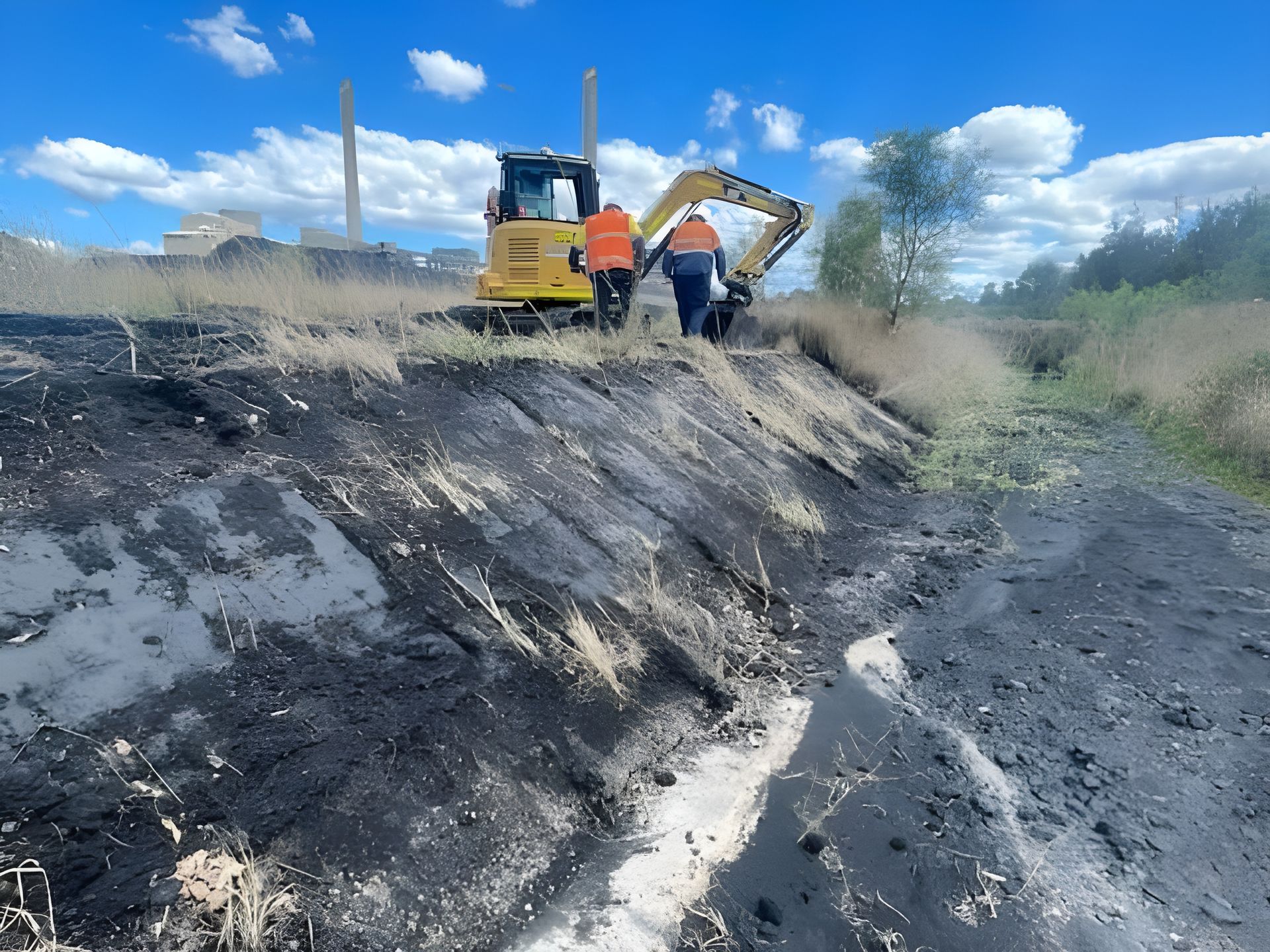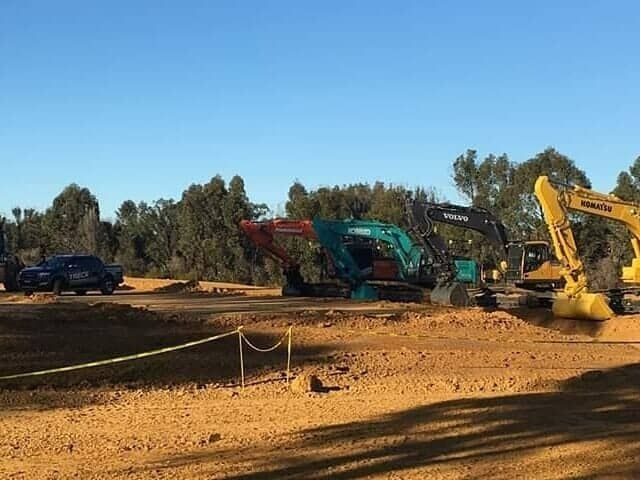(VOC) Verification of Competency on the Mid North Coast
Contact Treck Industries On The Mid North Coast
Header Contact VOC Mid North Coast
Ensure Your Workforce's Capability
Verification of Competency (VOC) is a crucial element in ensuring your workforce has the required skills and expertise to safely and proficiently execute their job tasks. At Treck Industries, we offer a customised VOC program designed to cater to your industry's specific needs. Assessments, conducted by our experienced professionals, are available both on-site and off-site for added flexibility.
Our main focus lies in assessing the operation of typical machinery used in industries such as civil contracting, including excavators and skid steers. Our VOC program is aimed at enhancing safety and minimising risk associated with your organisation’s day-to-day operations.
Contact us to learn more about how our program can help your workforce in the Mid North Coast. Call
0456 000 968 today.
On the Mid North Coast, we conduct thorough Verification of Competency (VOC) assessments. These assessments are crucial for confirming that workers have the required skills and expertise to operate heavy machinery both safely and proficiently. Our assessors adopt a variety of techniques to confirm an individual’s practical skills as well as theoretical knowledge, providing confidence in their abilities.
After successfully completing our training courses on the Mid North Coast, individuals receive a Statement of Attainment, a nationally recognised certification. This statement is a testament to their newly acquired skills and knowledge, allowing them to meet job specifications or seek new opportunities with confidence.
On the Mid North Coast, our plant training programs are designed to provide practical and comprehensive education on the safe usage of heavy machinery. Concurrently, our refresher training courses provide updates and reinforce these skills, ensuring that operators remain current with the latest safety standards and technological advancements, thereby mitigating risks and enhancing productivity.
The Benefits of VOCs
VOCs offer a range of advantages to both employers and workers in the Mid North Coast region:
- Safety: By ensuring workers have the necessary skills and knowledge, VOCs contribute to creating a safer work environment by reducing the risk of accidents.
- Compliance: VOCs demonstrate an organisation's compliance with regulatory requirements and industry standards, protecting against potential legal consequences.
- Risk Mitigation: With skilled workers, the risk of costly damages and incidents caused by inexperienced personnel is reduced.
- Quality Assurance: The proficiency ensured by VOC assessments leads to better quality work, ultimately improving project outcomes.
- Efficiency Boost: Skilled workers are more efficient, leading to reduced delays and increased productivity.
- Reputation & Trust: A commitment to safety and competence through VOCs can enhance an organisation's reputation and build trust with clients, increasing business opportunities.
- Adaptability: VOC programs can be updated to keep up with advancements in technology and changes in regulations, ensuring workers stay current with industry best practices.
Our Course List
Strengthen your skills and knowledge in civil construction dozer operations, including pre-start and slot dozing stockpiling and more. This course is appropriate for those working in operational roles.
This unit examines your capacity to confidently complete excavator operations in civil constructions. Items in this course include operating, fitting attachments, maintenance, trenching, benching, stockpile work and more.
In this course, we assess the participant’s ability to effectively use and operate a roller in construction situations. This includes preparing for operation, compaction requirements, best practices and more.
Enhance your skills and knowledge in articulated haul truck operations across four areas—civil construction, coal mining, extractive and metalliferous mining. This unit is suitable for those in operational roles.
Grow your skills and become better at operating a scraper in civil construction. Components include preparing the machine for operation, coupling, performing routine maintenance, best practices and more.
Operate water carts in civil construction situations with confidence. Assessment items in this unit include operating the water cart, loading, transporting and distributing water and fault-finding in the machine.
In this unit, we assess the operator's skills in loading and unloading plant items on floats or trailers within the resources and infrastructure industry. This unit is appropriate for those in operational roles.
Gain the skills and knowledge needed to conduct operations in a wheeled front-end loader for civil construction work. This includes truck loading, stockpiling, floor maintenance and more.
Improve the skills and knowledge you need to operate a wheeled dozer in mining and civil construction works. Criteria of this unit include prestarts, floor maintenance, pushing bulk materials, stockpiling and compaction requirements.
This unit is designed to ensure participants are able to perform at-height work safely. Aspects of this unit include ensuring safety systems have been installed correctly, ensuring access is clear and using the correct harness and anchoring method.
This unit covers skills related to the operation of a gantry or overhead crane, such as planning, preparing and operating the crane. This certification relates to the national standard for high-risk work.
This unit ensures participants are capable of testing the operational functions of vehicles and equipment in the coal mining, extractive and metalliferous mining industries. This course is appropriate for those working in operational roles. Such as fitters, electricians and float operators.
Enhance your skills and knowledge when operating a rigid haul truck in civil constructions and coal, extractive and metalliferous mining. Skills include inspecting, loading, driving to conditions, safe operation of all braking systems correct positioning under the loading machine and more.
Build upon your skills in backhoe and loader operations with this unit. Performance criteria include operating the machinery, carrying materials, fitting attachments, trenching, benching, utilising 4 in 1 bucket functions and more.
Up-skill and ensure you're up to date with operating a skid steer loader. Elements of this unit include preparing for operation of the machine, fitting attachments, truck loading, trenching, backfilling, levelling, 4 in 1 bucket operations and more.
Refine your skills in operating a tractor in civil construction. Assessment items include fitting attachments, operation of three implements, safe operation on grade and slope, machine maintenance and more.
Ensure you have the right knowledge to operate a grader during civil constructions. This unit looks at operating the machine, fitting and removing attachments, drainage, road constructions and maintenance, batter constructions, scarifying and more.
Enhance your knowledge in the operation of self-propelled compactors on civil construction sites. Elements of this unit include operating, compaction requirements, load placements, best practices and more.
This unit examines the skills of anyone operating a vehicle loading crane. Performance criteria includes maintaining a loading crane, identifying and controlling hazards, operating crane to OMM requirements and more.
Increase your knowledge in the operation of tracked front end loaders in civil constructions. This unit includes prestart inspections, site preparations, truck loading, stock piling and more.
Enhance your skills in operating a light vehicle within the resource and infrastructure industries. Elements of this unit include prestart on vehicle, safely operating machine, driving to conditions and policies, vehicle maintenance and more.
Refine your skills when operating a four-wheel drive within a variety of industries. Performance criteria for this unit include planning for minimal environmental impact, using a four-wheel drive in all modes, and using a single snatch to recover a vehicle, winching, stall recovery, best practices and more.
In this unit, participants will enhance their skills in operating a telescopic materials handler machine. Elements of this unit include fitting attachments, lifting, carrying and placing materials, relocating the machine, machine maintenance and more.
In this unit, participants enhance skills and knowledge required to conduct tip truck operations in the Resources and Infrastructure Industries. Some elements include planning and preparation, pre-operational checks, operation of tip truck, loading and transportation of materials, maintenance and clean-up.
In this unit, participants gain skills and knowledge required to conduct pile driving operations in Civil Construction. Elements include planning and preparation, location of pile positions, establishment of piling rig plant, drive pile, remove piling rig and clean-up. Appropriate for those working in operational roles.
Unit describes a skills and knowledge required to operate an elevating work platform in the Resources and Infrastructure Industries. Appropriate for operational roles. Elements include planning, preparation, conducting activities from EWP, operational maintenance and clean-up.
Contact Us
Contact VOC Mid North Coast
Phone
Location
Business Hours
- Monday
- Open 24 Hours
- Tuesday
- Open 24 Hours
- Wednesday
- Open 24 Hours
- Thursday
- Open 24 Hours
- Friday
- Open 24 Hours
- Saturday
- Open 24 Hours
- Sunday
- Open 24 Hours

















